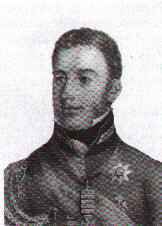


While in Spain, Wellington awarded Pakenham command of a brigade of the 1st Division in 1809. By 1811 he was promoted to the rank of major- general. He served with distinction at the seige of Badajoz, taking comand of the 3rd Division when General Picton (who was later killed during the opening stages of the Battle of Waterloo) was wounded. Pakenham acquitted himself in a brilliant manner at Salamanca, earning very high praise from Wellington. Pakenham stayed on as commander of the 3rd Division until 1813, when he was given the 6th. By mid-year, Wellington apponted Pakenham to be his Adjudant-General, but returned to command the 6th when its temporary commander was wounded at the Battle of Sorauren. He returned to the staff in August and remained Adjudant- General until the close of the Peninsular campaign. He was made a Knight of the Bath in September, 1813.
When General Ross was killed at Bladensburg in 1814, Pakenham was appointed to command the British troops in America. He arrived in Louisiana in December, 1814, only to find that the Royal Navy had landed his troops in the malaria-infested swamps south of Louisiana. This deployment put the British in a very weak position and should have been abandonded. Pakenham decided that he could not improve the deployment, and his men were getting sick and dying in the swamp. These factors forced him to move on the city of New Orleans. On January 8th, 1815, he led a frontal assault through the woods to the south of the city. He was met in what is now Chalmette by American troops under the command of General (later President) Andrew Jackson.
Pakenhamís tactics were fairly standard for the period. What he failed to realize was that he was significantly out-gunned. The Americanís cannon were larger and better placed, and the Americansí rifles were far superior to the un-rifled muskets of the British Regulars. The range of the Kentucky long rifles used by the Americans was so good that they were picking off the British long before the advancing troops could get into range. Pakenham was killed during the course of the battle, and tradition has it that his heart was removed from his body and buried on the battlefield before his body was brought back to England.
Pakenham was not the most brilliant of Englandís generals, but he was an able commander who served his country with distinction. His defeat at New Orleans is really just a footnote in the history of a battle that is in itself merely a footnote in history. Had Pakenham not been the able man he was in Spain, the war against Napoleon might have gone differently for Wellington and Britain.